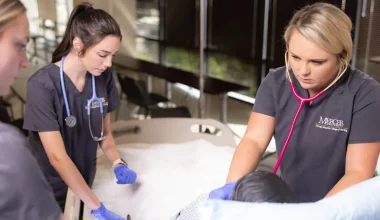If you’re interested in pursuing a career as a physician’s assistant (PA), one of the first questions you might have is how long it takes to become one.
PAs are in high demand and play a crucial role in the healthcare industry, working alongside physicians to provide medical care to patients.
The path to becoming a PA can vary depending on the program and the individual’s educational background, but in this article, we’ll break down the different steps involved and give you a general idea of how long it takes to become a physician’s assistant. Read on to learn more.
Table of contents
- Who is a Physician Assistant?
- What are the job responsibilities of a Physician Assistant?
- What are the educational requirements to become a Physician’s Assistant?
- How long does it take to become a Physician’s Assistant?
- How much does it cost to become a Physician’s Assistant?
- What is the difference between a Physician’s Assistant and a Medical Doctor?
- Can you become a Physician’s Assistant with a nursing degree?
- Are there any online Physician’s Assistant programs?
- How much do Physician Assistants make?
- What are the job prospects like for Physician’s Assistants?
- How Long is PA School: Frequently Asked Questions
- Conclusion
- Recommendations
Who is a Physician Assistant?
A Physician Assistant (PA) is a licensed healthcare professional who practices medicine as part of a team with physicians and other healthcare providers.
PAs are trained to provide diagnostic, therapeutic, and preventive healthcare services under the supervision of a physician. They take medical histories, conduct physical checkups, diagnose and treat illnesses, order and interpret diagnostic tests, develop treatment plans, and prescribe medications.
PAs work in various settings, including hospitals, clinics, physician offices, and other healthcare facilities, and can specialize in areas such as primary care, surgery, emergency medicine, and psychiatry.
READ ALSO: 15 Best Grants For Pregnant Women In 2023
What are the job responsibilities of a Physician Assistant?
The job responsibilities of a Physician’s Assistant (PA) can vary depending on the specialty, practice setting, and supervising physician. In general, PAs are trained to perform a wide range of medical tasks and responsibilities, including:
- Conducting patient assessments: Taking medical histories, performing physical exams, and ordering diagnostic tests.
- Diagnosing and treating illnesses: Interpreting test results, diagnosing illnesses, and developing treatment plans.
- Performing medical procedures: Performing minor surgical procedures, such as suturing and casting.
- Prescribing medications: Writing prescriptions for medications and adjusting dosages as needed.
- Educating patients: Providing information on health promotion, disease prevention, and treatment options.
What are the educational requirements to become a Physician’s Assistant?
The educational requirements to become a Physician’s Assistant (PA) typically include the following:
- Bachelor’s degree: A minimum of a bachelor’s degree from an accredited college or university has to be considered for admission to a PA program. The degree can be in any major, but it is recommended to have a strong background in science and healthcare-related courses.
- Prerequisite courses: Many PA programs require specific prerequisite courses, such as anatomy, physiology, microbiology, and chemistry. It is important to research the specific requirements for each program before applying.
- PA program: Completing an accredited PA program is required to become a PA. PA programs usually take 2-3 years, including classroom instruction and clinical rotations in various medical specialities.
- Clinical rotations: PA students typically complete several clinical rotations during their program, which provide hands-on experience in areas such as family medicine, emergency medicine, surgery, and paediatrics.
- Certification: After completing a PA program, graduates must pass the Physician Assistant National Certifying Exam (PANCE) to become certified and licensed to practice as a PA.
Read this: 15 Skin Care Specialist Schools in the World | Rankings 2023
How long does it take to become a Physician’s Assistant?
The time it takes to become a Physician’s Assistant (PA) can vary depending on the individual’s educational background and the PA program they choose to attend. In general, the path to becoming a PA includes the following steps:
- Bachelor’s degree: Typically takes 4 years to complete.
- PA program: Most PA programs take 2-3 years to complete.
- Clinical rotations: PA students complete several clinical rotations during their program, which can take several months to a year to complete.
- Certification: After completing a PA program, graduates must pass the Physician Assistant National Certifying Exam (PANCE), which can take several months to prepare.
Generally, the path to becoming a PA typically takes a minimum of 6-7 years to complete, including the time required to complete a bachelor’s degree and a PA program. However, some individuals may take longer if they pursue additional education or encounter delays in their educational or certification process.
How much does it cost to become a Physician’s Assistant?
Becoming a Physician’s Assistant (PA) can vary depending on the individual’s educational background, the PA program they choose to attend, and other factors such as living expenses and transportation costs. Some of the costs associated with becoming a PA may include the following:
- Undergraduate degree: The cost of obtaining a bachelor’s degree can vary widely depending on the school, with average annual tuition ranging from around $10,000 to $35,000 or more.
- PA program: The cost of a PA program can vary widely depending on the school and the program length, with average tuition ranging from around $50,000 to $100,000 or more.
- Textbooks and other materials: The cost of textbooks and other required materials for PA programs can add up, with average costs ranging from around $1,000 to $2,000 or more.
- Certification exam: The Physician Assistant National Certifying Exam (PANCE) cost currently $500.
- Living expenses: Depending on the location of the PA program, living expenses such as rent, utilities, and transportation costs can add up to thousands of dollars per year.
Overall, the total cost of becoming a PA can range from around $60,000 to well over $150,000, depending on the individual’s circumstances. It is important to carefully research the costs of different PA programs and explore options for financial aid and scholarships to help manage education costs.
READ ALSO: 21 Best Nail Tech Schools in 2023 | Requirements, Admission
What is the difference between a Physician’s Assistant and a Medical Doctor?
While both Physician Assistants (PAs) and Medical Doctors (MDs) work in the healthcare field and provide medical care to patients, the two professions have some key differences.
- Education: MDs typically complete 4 years of medical school after earning a bachelor’s degree, while PAs usually complete a 2-3 year PA program after earning a bachelor’s degree. MDs also complete a residency program that can last anywhere from 3-7 years, depending on the specialty, while PAs do not have a residency requirement.
- Scope of practice: MDs have a broader scope of practice than PAs, with the ability to diagnose and treat a wider range of medical conditions, perform surgeries, and prescribe medication independently. PAs work under the supervision of MDs or other licensed physicians, and state laws and regulations determine their scope of practice.
- Responsibility: MDs have ultimate responsibility for patient care, while PAs work as part of a healthcare team under the supervision of a physician.
- Salary: Doctors earn way better than PAs.
Can you become a Physician’s Assistant with a nursing degree?
Becoming a Physician’s Assistant (PA) with a nursing degree is possible but typically requires additional education and training.
Firstly, to become a PA, you must complete a PA program accredited by the Accreditation Review Commission on Education for the Physician Assistant (ARC-PA). Most PA programs require applicants to have a bachelor’s degree and prior healthcare experience, but the degree doesn’t necessarily have to be in a specific field.
Secondly, while a nursing degree can provide a good foundation for a healthcare career, PAs require different skills and knowledge than nurses. Therefore, nursing graduates who want to become PAs may need additional coursework or training to meet the prerequisites for a PA program.
Some PA programs offer a bridge program for nurses that allows them to earn both a bachelor’s and master’s degree in Physician Assistant Studies in less time than completing each degree separately. These programs usually require the applicant to have a current nursing license and some work experience as a nurse.
In summary, while becoming a PA with a nursing degree is possible, it typically requires additional education and training to meet the prerequisites for a PA program.
SEE ALSO: How can I become a Massage therapist in 2023? Schools, Cost Programs & Salary
Are there any online Physician’s Assistant programs?
Yes, there are online Physician’s Assistant (PA) programs available. However, it’s important to note that all PA programs must be accredited by the Accreditation Review Commission on Education for the Physician Assistant (ARC-PA). This organization sets standards for program quality and ensures that graduates are eligible to take the national certification exam required to become licensed.
While most PA programs require in-person clinical rotations and hands-on training, some programs have developed hybrid models that combine online coursework with on-campus or in-person clinical experiences. These hybrid programs may allow students to complete coursework online while providing hands-on training opportunities.
How much do Physician Assistants make?
According to the U.S. Bureau of Labor Statistics (BLS), the median annual wage for Physician’s Assistants (PAs) was $117,670 as of May 2020. However, salaries can vary based on location, years of experience, specialty, and type of employer.
PAs who work in specialty hospitals tend to earn higher salaries than those who work in outpatient care centres or physician offices. PAs in certain specialties, such as dermatology or emergency medicine, may also earn higher salaries than those in other specialties.
What are the job prospects like for Physician’s Assistants?
The job prospects for Physician’s Assistants (PAs) are very positive. According to the U.S. Bureau of Labor Statistics (BLS), employment of PAs is projected to grow 31 per cent from 2020 to 2030, which is much faster than the average for all occupations.
The demand for healthcare services is expected to increase as the population ages and more people gain access to healthcare through the Affordable Care Act. PAs are seen as a cost-effective way to expand access to healthcare, as they can provide many of the same services as physicians at a lower cost.
In addition, PAs are increasingly being used in specialty areas such as surgery, psychiatry, and emergency medicine, which is expected to drive demand for PAs in those areas.
Overall, the job prospects for PAs are very positive, with strong demand and growth projected for the foreseeable future.
Also, check this: 10 Free Online Beauty Courses with Certificates 2023
How Long is PA School: Frequently Asked Questions
The certification process for Physician Assistants is relatively straightforward. After completing an accredited Physician Assistant program, you must take the Physician Assistant National Certifying Examination (PANCE). This exam covers medical knowledge, patient care, and professional development. Once you have passed the PANCE, you will be eligible to become a certified Physician Assistant.
In addition to passing the PANCE, most states require Physician Assistants to obtain a medical license. The requirements for licensure vary by state but generally include completing a background check and submitting proof of your PANCE score.
Overall, the certification process for Physician Assistants involves passing the PANCE exam and obtaining a license from your state’s medical board. With these credentials, you can begin practising as a certified Physician Assistant.
Admission to Physician’s Assistant (PA) programs is highly competitive. Most PA programs receive hundreds of applications for limited spots, so that the competition can be tough.
Your best bet for increasing your chances of admission is to have an excellent academic record, with strong grades in all prerequisite courses.
Additionally, having meaningful clinical experience demonstrating your commitment to the profession and understanding of patient care is important. Finally, having strong references from people who can speak to your qualifications and character will also help you stand out.
In all, it’s important to remember that PA school admissions are highly competitive, but with hard work and dedication, you can increase your chances of success.
Yes, there are scholarships available for Physician Assistant programs! Scholarships can come from various sources, such as your school, professional organizations, and private donors. Researching when looking for scholarships and grants to help fund your PA program is important.
When researching scholarship opportunities, consider any eligibility requirements that may apply. Some scholarships may require applicants to demonstrate financial need or have a minimum GPA. Additionally, some organizations will offer scholarships specific to certain areas of study, such as primary care or rural health.
Finally, don’t forget to check with your school’s Financial Aid office or the PA Program Director for more information about potential scholarship opportunities. Good luck with your search.
Conclusion
Becoming a Physician’s Assistant can be a rewarding career choice for those interested in healthcare. While the educational requirements can be demanding, the job prospects for PAs are very positive, with strong demand and growth projected for the foreseeable future.
PAs play a critical role in expanding access to healthcare, and their responsibilities and contributions to patient care are highly valued in the healthcare industry.
Whether you are just starting to explore career options or are looking to make a career change, becoming a Physician’s Assistant may be worth considering as a path towards a fulfilling and meaningful career in healthcare.
Recommendations
- 15 Skin Care Specialist Schools in the World | Rankings 2023
- How Long Is Cosmetology School?
- How Can I Become a Dermatologist? Salary, Cost, and Programs
- 10 Free Online Beauty Courses with Certificates 2023
- How To Become A Certified Aromatherapist In 2023 | Schools, Cost, Job Outlook



